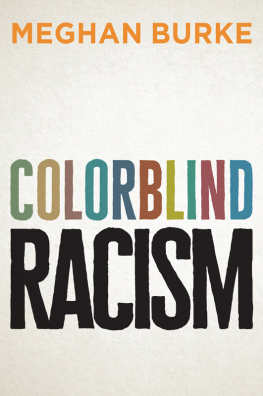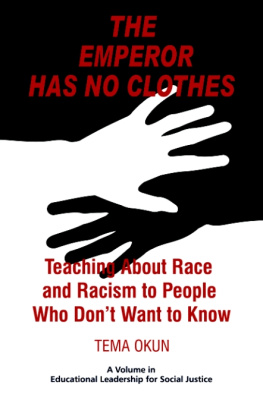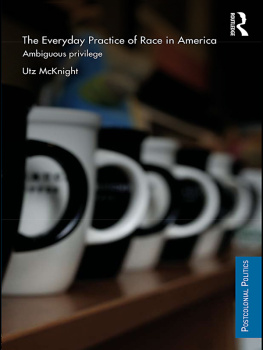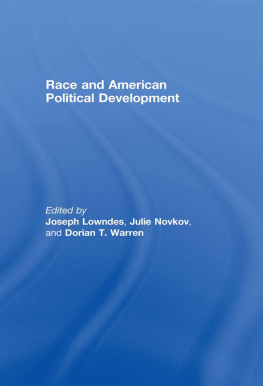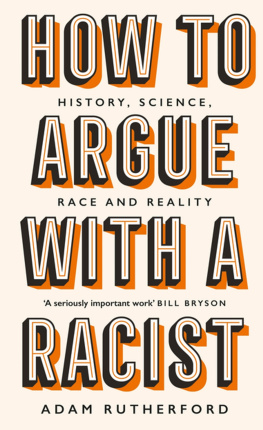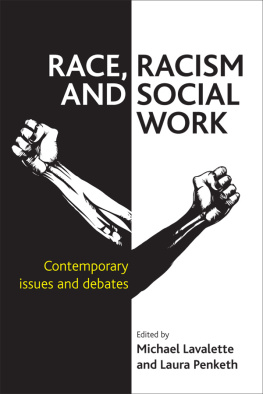
About the author
KALPANA WILSON is a Fellow at the Gender Institute, London School of Economics. Her experiences teaching development studies in British universities, as well as her involvement as an activist around issues of racism and imperialism, led her to pursue the themes of this book. She has also written and researched extensively on agrarian transformation in Bihar in India, womens participation in rural labour movements and the relationships between neoliberalism, gender and concepts of agency.
Race, racism and development
Interrogating history, discourse and practice
KALPANA WILSON

Zed Books
LONDON | NEW YORK
Race, Racism and Development: Interrogating History, Discourse and Practice was first published in 2012 by Zed Books Ltd, 7 Cynthia Street, London N1 9JF, UK and Room 400, 175 Fifth Avenue, New York, NY 10010, USA
This ebook edition was first published in 2013
www.zedbooks.co.uk
Copyright Kalpana Wilson 2012
The right of Kalpana Wilson to be identified as the author of this work has been asserted by her in accordance with the Copyright, Designs and Patents Act, 1988
Designed and typeset in Monotype Bembo Book by illuminati, Grosmont
Index:
Cover design: www.roguefour.co.uk
All rights reserved. No part of this publication may be reproduced, stored in a retrieval system or transmitted in any form or by any means, electronic, mechanical, photocopying or otherwise, without the prior permission of Zed Books Ltd.
A catalogue record for this book is available from the British Library
Library of Congress Cataloging in Publication Data available
ISBN 978 1 78032 564 4
Acknowledgements
This book has taken me a long time to write and an even longer time to start writing. Far from being based on a discrete period of research, it has been influenced by so many people, and in such varied contexts, that acknowledgements are perhaps particularly difficult to write. Among those whom I would especially like to thank for reading and commenting on parts of the manuscript and for discussing its themes and sharing their knowledge and ideas with me are Vron Ware, Andrea Cornwall, Nalini Visvanathan, Charles Abugre, Samarendra Das, Sadie Wearing, Jin Haritaworn, Paul Gilroy, Clare Hemmings, Anne Phillips, Sumi Madhok, John Newsinger, Diane Perrons, Ania Plomien, Anandi Ramamurthy, Carolyn Williams, Gwendolyn Beetham, Naaz Rashid, Sachin Gupta, Jeanne Firth and Caitlin Fisher.
My colleagues at the LSE Gender Institute have been unfailingly supportive and encouraging during the period this book has been in the making. I would also like to thank all the students at Birkbeck who took my Race, Ethnicity and Development MSc option course from 2004 onwards and whose questions, arguments and insights helped me to clarify and develop my ideas for the book, my colleagues on the Development Studies programme at Birkbeck, and especially Jasmine Gideon for her ongoing support for both the course and the book.
At Zed Books, I benefited from the expertise and patience of my editors Tamsine ORiordan, who shared my enthusiasm for this project from the outset, and Jakob Horstmann, who helped to keep me writing with his perfectly timed emails!
The book owes a great deal to South Asia Solidarity Group, as a member of which I have been involved in many of the political campaigns referred to in the book, and especially my dear friend Sarbjit Johal, who is continuing to participate in them and to inspire others while courageously waging a protracted battle with illness.
This book would never have happened without the taken-for-granted support and enthusiasm of my family John Wilson, my father, whose passion for and in-depth knowledge of history I have turned to repeatedly, my daughter Ananya Wilson-Bhattacharya with her clarity of vision and her optimism about the future, and of course Dipankar Bhattacharya who always, even across continents, succeeded in convincing me that this book was worth writing, and that I could write it. Finally, my mother, Amrit Wilson, has been beside me every step of the way, and made it possible in uncountable ways this book has been inspired by the dreams we share.
Introduction
I was in the last stages of completing this book in March 2012 when the Kony 2012 video went viral. The video and the responses it generated seemed to highlight many of the questions I had been thinking and writing about over the preceding months. Produced by the US-based NGO Invisible Children, the video was part of a campaign for the arrest of Ugandan Joseph Kony, the leader of the armed group the Lords Resistance Army, and his trial by the International Criminal Court for crimes against humanity, in particular the abduction of thousands of children as soldiers. The video called for US military intervention in Central Africa to be stepped up in order to Stop Kony and targeted young people in the global North to join a mass movement demanding this action.
Less than three weeks after being uploaded to the Internet, Kony 2012 had been viewed by more than 84 million people, and had already generated intense controversy. Many commentators highlighted the fact that the video was heavily oversimplified and referred to a situation which had since changed drastically Kony was no longer active in Uganda, and, it was argued, resources were more urgently needed to help ex-child soldiers to rebuild their lives than for the mission of capturing him. Perhaps most tellingly, although this was less widely circulated in the mainstream media, far from being reluctant to sustain a military presence in the region as the video suggests, the US administration had ongoing military involvement and significant strategic and economic interests in the area bordering Uganda and the DRC (where Kony had now fled), not least because of the existence of significant oil resources which are already being exploited by North American and British companies.
Meanwhile, other writers focused on the racism implicit in Kony 2012, which was seen as reproducing colonial narratives about Africa in which white people are constructed as having a moral obligation to intervene to rescue and save black people from chaos, violence and irrationality. Although the video is ostensibly about children in Uganda, the emotional core of the film is in fact the scene in which the white American film-maker Jason Russell shows his 5-year-old son a photograph of the bad guy Joseph Kony, setting up a highly racialised dichotomy between the evil black man and the innocent white child who, once he understands the all-too-simple problem, can help to fix it.
But these two strands of criticism of the role of global capital in producing the US military intervention the video supports, and of the role of ideas of race and of racism in shaping the video remained largely separate. The questions I would like to pose in this context relate to the connections between the two. What is the work that ideas of race do here? Can we understand Kony 2012 as not simply reflecting latent racism, but mobilising it, and if so, to what ends? More broadly, how do we understand the ongoing relationship between race and capital on a global scale? How does racism inform and legitimise changing patterns of exploitation, exchange and accumulation? And how do these patterns, in turn, reproduce material inequalities which continue to be explained through a lens of race?
In this book, which in many ways takes these questions as a starting point, I have sought to bring a critical understanding of race and racism into the same frame as development, which I conceptualise as including not only the vast array of development organisations and initiatives but the wider processes of economic, social and political change with which these are concerned.
Next page


